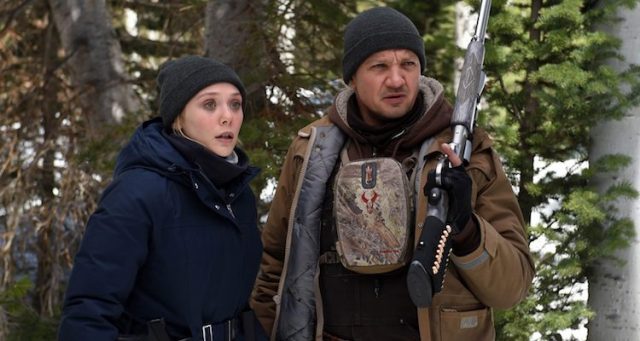
A handful of innocent sheep are stalked by a coyote at the beginning of “Wind River,” an intense, somber mystery-thriller set on the Wyoming Indian reservation of that name. But the coyote is soon dispatched by a greater predator, or at least a better-armed one: Cory Lambert (Jeremy Renner), a hunter for the fish and wildlife department whose job is to track and kill animals that track and kill.
Thus the dynamic is set for the film, a “humans are the most vicious animals” story based loosely on real events, written and directed by Taylor Sheridan, writer of “Sicario” and “Hell or High Water.” Cory, a white man with deep ties to the Indian community — he married a Native American woman and has a biracial son — is called upon for help when a young Arapaho woman, Natalie (Kelsey Asbille), is found dead in the snow, barefoot, miles from shelter, showing signs of rape. Investigating FBI agent Jane Banner (Elizabeth Olsen) and the tribal police chief (Graham Greene) agree that foul play was involved, but since Natalie’s official cause of death is exposure rather than homicide, Banner can’t immediately summon additional FBI resources, and the tribal police are understaffed.
But as Cory points out, traditional detective work isn’t what’s needed here anyway. Law-enforcement can interview the reservation’s usual suspects (which include a pair of ne’er-do-well brothers and Natalie’s own brother) and look at surveillance footage from a nearby drilling station, but Cory says the truth will be in the tracks — Natalie’s footprints, snowmobile tracks, and other markings in the snow. He quietly but readily agrees to help Banner follow the trail of clues, still nursing his own grief over the death of his daughter a few years earlier. This grief makes him compassionate to the present victim’s father, his friend Martin (Gil Birmingham), and leads to a tender monologue that is some of Renner’s best work.
The mystery of Natalie’s death does not go unsolved, but it becomes apparent that it’s not Sheridan’s primary objective. The more time we spend with the reservation’s inhabitants, from the upstanding to the delinquent, the more we’re overwhelmed by how much they hate the place. “Frozen hell” is how one person describes it, a dead-end, God-forsaken wasteland where the harshness of nature is made worse by the apathy (if not malevolence) of the government toward the people who live there. The tragedy at the center of the story is part of a greater injustice spanning many decades.
It’s a familiar plot with familiar details, executed with sober brutality and surprising compassion and punctuated by sequences of ghastly tension as the various forces — Cory, the FBI, the tribal police, the suspects, the oil-drilling company leasing land on the reservation — come to be at odds with one another. But there’s one particular touch that makes it something special, and it has to do with when and how Sheridan reveals the facts about the night Natalie died. His narrative choices here are a masterstroke by a storyteller at the top of his game.
B+ (1 hr., 47 min.; )





